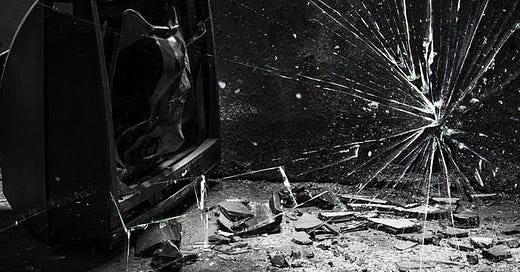It’s been said that riots are the language of the unheard. I reluctantly attribute these words to Dr. Martin Luther King Jr., not because he doesn’t deserve credit but because his observation has so often been misconstrued. He was not condoning much less promoting violence. He said it in this context:
“I’m absolutely convinced that a riot merely intensifies the fears of the white community while relieving the guilt. And I feel that we must always work with an effective, powerful weapon and method that brings about tangible results. But it is not enough for me to stand before you tonight and condemn riots. It would be morally irresponsible for me to do that without, at the same time, condemning the contingent, intolerable conditions that exist in our society. These conditions are the things that cause individuals to feel that they have no other alternative than to engage in violent rebellions to get attention. And I must say tonight that a riot is the language of the unheard. And what is it America has failed to hear? It has failed to hear that the plight of the negro poor has worsened…. It has failed to hear that the promises of freedom and justice have not been met. And it has failed to hear that large segments of white society are more concerned about tranquility and the status quo than about justice and humanity.”
There’s a lot to unpack in Dr. King’s remarks. The acknowledgement that protest is at its core an exercise of free speech, an airing of grievances, a venting of frustration, a plea for justice. Then there’s his strong belief that protests defeat their own purpose when they turn violent. In the next breath, a pointed suggestion that protest is a weapon. He didn’t misspeak, nor did he contradict himself. He well understood the complexities, pitfalls and power of protest.
What was so clear to Dr. King in his time is blurry in ours. In this perilous moment, with so much at stake, many take to the streets for the same reason people pay good money to smash kitchen appliances and home electronics in rage rooms. To blow off steam. To feel better afterwards. A totally understandable impulse. But that impulse is far too blunt an instrument to produce change. And that’s what King was after, an “effective, powerful weapon,” a “method that brings about tangible results.”
Those not drawn to marching often see street demonstrations as more of a lifestyle than a method, more fashion statement than indictment of unjust conditions, more a declaration of identity than an act of conscience or sacrifice for the greater good, more performative than persuasive.
Having organized quite a few demonstrations myself and having attended countless others, I hear what they’re saying and can relate to it, protests can indeed feel like competitions. Who has the cleverest sign, who wears the most provocative get-up, who gets to lead the chants, who comes across as more radical than thou. Sometimes it seems like demonstrators see each other as the target audience, not those in power, not the general public.
When self-gratification gets in the way, even actions with the best intentions become off-putting and their purpose is undermined. When anger does the driving, protesters play right into the hands of the perpetrators of injustice. Those wielding great power rarely pass up a chance to irritate and infuriate protesters, aiming to bait them into acts of violence, knowing that rioting spooks the broader community and turns people against even the noblest of causes.
King speaks to us still, reminding us that to be effective, protest needs to reach across social boundaries and engender sympathy, that skillful protesters don’t permit themselves to be baited into alienating behavior, don’t waste energy trying to one-up each other. Remember, Dr. King’s appeals for justice drew heavily from the nation’s founding documents written by slaveholders, disappointing or even angering many fellow blacks but melting stubborn white resistance to civil rights.
King speaks to us still, reminding us that to be powerful, protesters need weaponry. King was a student of the Indian independence leader Mahatma Gandhi, who was widely but wrongly regarded as a pacifist. Gandhi knew injustice needed to be fiercely fought and did not hesitate to take up arms of his choosing, coining the term satyagraha by combining the Sanskrit words for truth and force, making a weapon he considered vastly superior to sticks, stones, bullets and bombs.
Gandhi made no bones about his objective, proclaiming that “the function of a civil resister is to provoke a response.” In 1930, Gandhi led a 240-mile march to the sea to break the law giving colonial rulers a monopoly on the making and sale of salt. That and other similar applications of the potent combination of truth and force brought down an empire. When King applied Gandhi’s teachings to the American civil rights movement, he described his weapon as “soul force.”
Gay rights advocates in the U.S. showed an advanced understanding of the use of such force when they shrewdly recalibrated their message from one emphasizing differences and demanding equal treatment — “we’re here, we’re queer, get used to it!” — to one focusing on love, marriage and commitment to family.
Public opinion about homosexuality shifted dramatically. The widespread view of gay people as recklessly promiscuous and a threat to traditional values gave way to widespread acceptance of same-sex families. As recently as 1988, only one in ten Americans believed gay couples should have the right to marry, with over three-fourths saying gay sex is “always wrong.” Just three decades later, more than two-thirds supported gay marriage and it became the law of the land.
All of this is worth remembering today, a time fraught with peril, with so much at stake. The moment demands war rooms, not rage rooms. Capturing and holding the high ground is central to successful warfare. It’s also the whole point of impactful protest.



